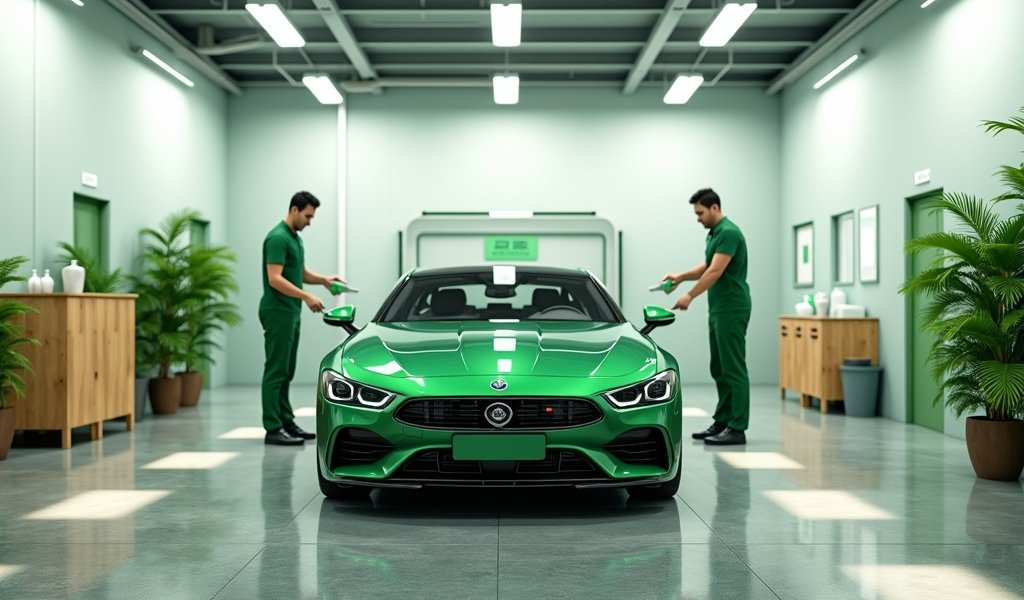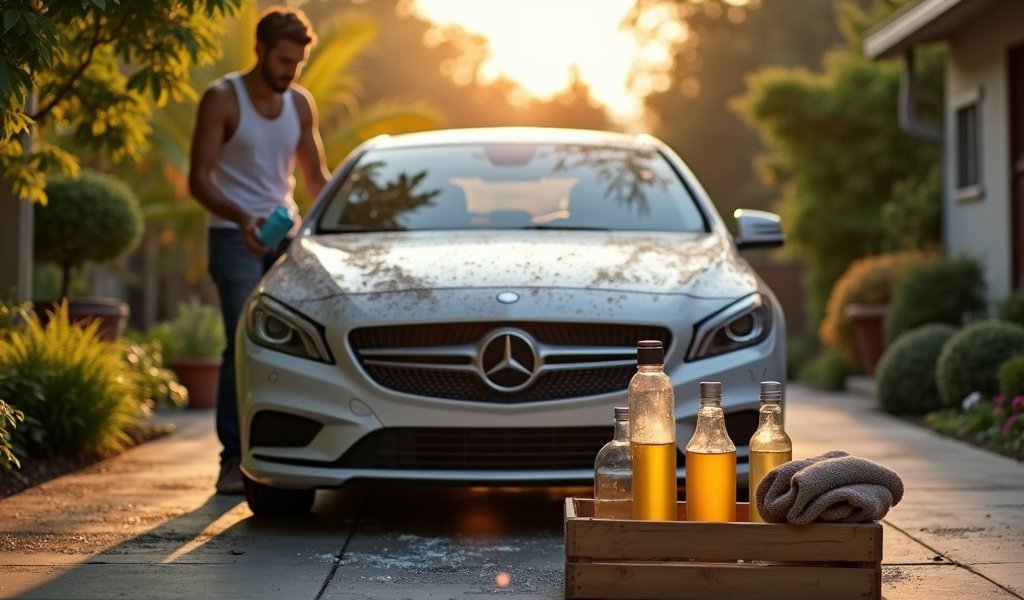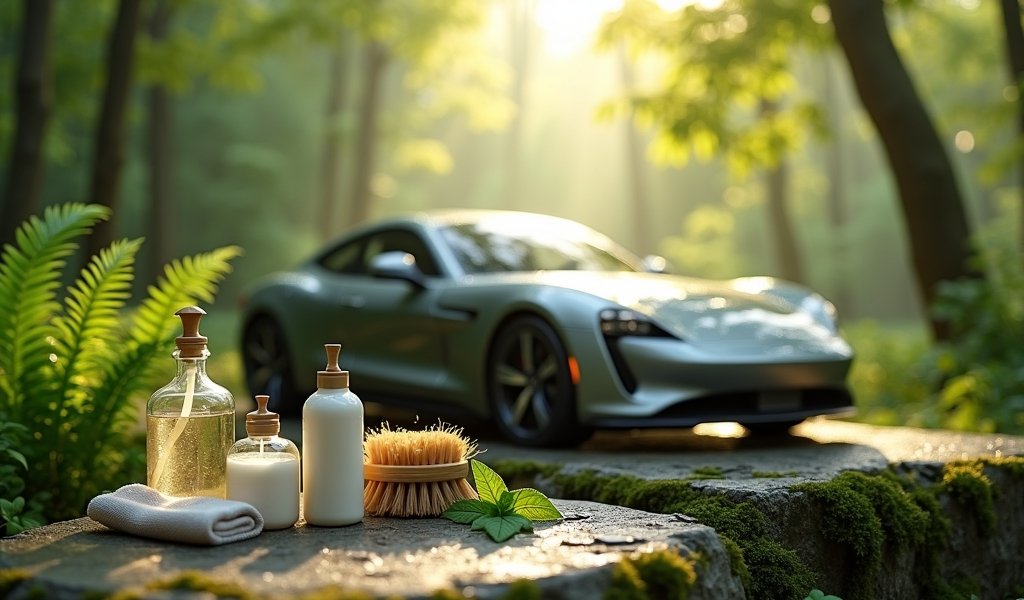Overview
This article explores the evolution of eco-friendly car care products, highlighting biodegradable soaps, waterless wash solutions, plant-based waxes, and microfiber tools that deliver excellent cleaning results while minimizing environmental harm. It provides specific brand recommendations, DIY alternatives, and practical tips for transitioning to greener car washing practices that protect both vehicles and ecosystems.
Table of Contents
- Introduction: The Green Revolution in Car Care
- Why Choose Eco-Friendly Car Wash Products?
- Biodegradable Car Wash Soaps: Clean Without Compromise
- Waterless Car Wash Products: Conservation Heroes
- Plant-Based Waxes and Polishes: Natural Protection
- Eco-Friendly Tools: The Microfiber Revolution
- DIY Eco-Friendly Car Wash Solutions
- Top Eco-Friendly Car Wash Brands Worth Your Money
- Conclusion
- Frequently Asked Questions
Introduction: The Green Revolution in Car Care
Remember when washing your car meant watching suds loaded with chemicals flow straight into storm drains? Those days are fading in our rearview mirrors. The world of eco friendly car wash products has exploded in recent years, bringing powerful cleaning solutions that won’t harm our waterways or the delicate ecosystems they support. As someone who’s spent twenty years under hoods and hosing down everything from classic coupes to modern SUVs, I’ve witnessed this green revolution firsthand.
When I first started in this industry, the options were limited – harsh detergents that cleaned well but left a trail of environmental damage in their wake. Today, we’re spoiled for choice with plant-derived surfactants, biodegradable formulations, and waterless options that deliver professional results without the ecological guilt. These products aren’t just good for Mother Earth – they’re actually gentler on your vehicle’s finish too.
In this comprehensive guide, we’ll dive into the best eco-friendly car wash products that deliver spotless results while keeping our planet blue. I’ll share insider knowledge on which green products actually work (and which ones are just greenwashing), practical tips for maximizing their effectiveness, and even some DIY alternatives that won’t break the bank. Whether you’re a seasoned detailing enthusiast or someone who just wants to wash their daily driver with a cleaner conscience, there’s something here for everyone who cares about both their car and their environment.
Why Choose Eco-Friendly Car Wash Products?
Before we dive into specific products, let’s talk about why making the switch matters. Traditional car wash products contain phosphates, synthetic detergents, and petroleum-based ingredients that wreak havoc on aquatic life. When these chemicals wash into storm drains, they eventually reach rivers, lakes, and oceans, where they can disrupt the balance of entire ecosystems. One afternoon of careless car washing can pollute thousands of gallons of water.
Beyond environmental concerns, these harsh chemicals can actually damage your vehicle over time. I’ve seen countless clear coats prematurely dulled by aggressive detergents. The strong solvents in conventional products strip away not just dirt but also your car’s protective waxes and sometimes even the clear coat itself. It’s like using sandpaper when all you needed was a soft cloth – effective but destructive.
Eco-friendly alternatives are formulated to break down naturally in the environment, typically within 28 days or less, according to EPA green chemistry principles. They’re made from renewable resources rather than petroleum derivatives, reducing our dependence on fossil fuels. Moreover, they often come in concentrated formulas or refillable containers, resulting in less plastic waste. Making this simple switch in your maintenance routine creates a ripple effect that extends far beyond your driveway.
Perhaps most surprisingly to many of my clients, eco-friendly products often outperform their traditional counterparts. They’ve evolved dramatically from the early “green” options that left something to be desired in the cleaning department. Modern plant-based surfactants are remarkably effective at lifting dirt and grime while being gentler on painted surfaces and trim pieces. It’s a win-win situation where you don’t have to sacrifice results for responsibility.

Biodegradable Car Wash Soaps: Clean Without Compromise
At the heart of any car wash routine is a good soap, and biodegradable options have come a long way. These formulations break down harmlessly in the environment while still creating that rich, lubricating lather we all love to see cascading down our vehicles. The secret lies in their plant-derived surfactants – molecules that have one end attracted to water and one end attracted to dirt, allowing them to lift grime away from surfaces without harsh scrubbing.
One standout product I consistently recommend is Puracy Natural Car Wash Concentrate. This plant-based formula creates abundant suds that encapsulate dirt particles and lift them safely away from your paint. What impresses me most is how it rinses clean without leaving residue, which is crucial for preventing water spots – those pesky mineral deposits that can mar an otherwise perfect finish. The formula is completely biodegradable and comes in a concentrated form that makes up to 96 gallons of wash solution, reducing plastic waste.
Another excellent option is Method Car Wash. Their biodegradable formula uses coconut-derived cleaning agents that are tough on dirt but gentle on both your car’s finish and the environment. I appreciate their commitment to transparency – every ingredient is listed with its purpose, something rarely seen in the automotive cleaning industry. Their soap produces a rich lather that doesn’t strip wax protection, meaning you’ll preserve that showroom shine longer between detailing sessions.
For those dealing with particularly dirty vehicles – think off-road enthusiasts or those in rural areas – finding a powerful car wash soap that still delivers shine while remaining eco-friendly can be challenging. In these cases, I recommend Biokleen Auto Wash. This concentrated formula contains grapefruit seed and orange essence that cut through heavy grime, road film, and even stubborn bug splatter, yet it’s completely biodegradable and phosphate-free.
The key to getting the most from these biodegradable soaps is using the two-bucket wash method – one bucket for soapy water and one for rinsing your mitt. This prevents you from redepositing grit back onto your paint surface, which can cause those dreaded swirl marks over time. Combine this technique with a high-quality microfiber wash mitt, and you’ll achieve professional results without professional-level environmental impact.
Waterless Car Wash Products: Conservation Heroes
When California faced severe drought conditions back in 2015, I witnessed a surge in waterless car wash products hitting the market. These innovative solutions have since evolved into some of the most effective eco-friendly options available. Waterless washes use specialized formulas that encapsulate dirt particles and provide enough lubrication to safely wipe them away without scratching your paint – all without requiring a single drop from your hose.
Optimum No Rinse Wash & Shine stands as the gold standard in this category. This remarkable product uses a polymer-based formula that encapsulates dirt particles, allowing them to be safely wiped away rather than scratched across your paint. Just one ounce diluted in two gallons of water can wash an entire car, making it incredibly economical. For spot cleaning, it can be used in a spray bottle at a stronger concentration. I’ve personally used this on everything from daily drivers to show cars with outstanding results.
For those who prefer a ready-to-use product, ECOS Waterless Car Wash is another excellent choice. This plant-derived formula comes in a convenient spray bottle and requires nothing more than a few microfiber towels to achieve a clean, shining finish. What separates it from competitors is its ability to clean effectively without leaving streaks – a common issue with many waterless products. The light lavender scent is a pleasant bonus that makes the chore of car washing slightly more enjoyable.
One tip I always share with clients new to waterless washing: pre-treat heavily soiled areas by spraying and allowing the product to dwell for 30-60 seconds before wiping. This gives the cleaning agents time to break down and encapsulate stubborn dirt. Also, fold your microfiber towels into quarters and rotate to clean sections as you work, ensuring you’re always using a clean surface for wiping.
It’s worth noting that waterless washes aren’t just for drought conditions – they’re perfect for apartment dwellers, those without easy access to water sources, or anyone looking to create an efficient DIY car wash at home. They’re also excellent for quick maintenance washes between more thorough cleanings. By eliminating the need for water entirely, these products represent perhaps the most environmentally friendly approach to keeping your vehicle clean.
Plant-Based Waxes and Polishes: Natural Protection
After washing comes protection – an essential step that many eco-conscious car owners struggle with. Traditional waxes and sealants often contain petroleum distillates, silicones, and other synthetic ingredients that don’t align with green values. Fortunately, plant-based alternatives derived from carnauba, candelilla, and other natural waxes provide excellent protection while maintaining your environmental commitment.
Carnauba wax, harvested sustainably from the leaves of Brazilian palm trees, forms the foundation of most eco-friendly waxes. This natural substance creates a deep, wet-looking shine that’s particularly striking on darker vehicles. Dr. Beasley’s Natural Carnauba Wax Cream exemplifies the perfect balance between natural ingredients and performance. The formula contains over 50% pure carnauba (much higher than most commercial waxes) along with coconut oil and beeswax, creating a protective barrier that beads water beautifully for up to three months.
For those seeking longer-lasting protection, Mothers California Gold Pure Brazilian Carnauba Wax offers an excellent compromise between natural ingredients and durability. While not 100% plant-based, it uses a significantly higher percentage of natural waxes than most mainstream products. The formula applies smoothly, buffs out easily (a major plus for those who’ve struggled with stubborn waxes), and provides protection that can last 4-6 months with proper maintenance.
If you’re looking for a quick solution between full waxing sessions, MotherEarth EcoWax Spray combines carnauba with natural oils to create a spray-on, wipe-off maintenance product. I recommend this to clients who want to extend their wax protection after washing without committing to a full application. It’s perfect for touching up high-wear areas like the hood and front bumper that face the brunt of environmental contaminants.

Eco-Friendly Tools: The Microfiber Revolution
The products you apply are only half the equation – what you apply them with matters tremendously for both environmental impact and results. Microfiber technology has revolutionized car care by providing reusable, highly effective cleaning tools that reduce waste while outperforming traditional options like cotton rags, paper towels, or natural sponges.
High-quality microfiber wash mitts represent one of the best investments you can make in eco-friendly car care. These densely woven synthetic mitts trap dirt particles away from your paint surface, dramatically reducing the risk of swirls and scratches. The Meguiar’s Microfiber Wash Mitt features deep, plush fibers that hold tremendous amounts of soapy water, providing excellent lubrication during washing. This mitt can be machine washed hundreds of times before needing replacement, making it far more sustainable than disposable alternatives.
For drying, nothing beats a proper microfiber drying towel with high GSM (grams per square meter) rating. The Chemical Guys Woolly Mammoth Microfiber Dryer Towel can absorb up to a gallon of water, allowing you to dry an entire vehicle with just one towel. Its gentle edges and plush weave prevent marring while efficiently removing water. When using a pressure washer for car cleaning, these absorbent towels become even more essential for quickly managing the additional water volume.
The key to maintaining the eco-friendliness of your microfiber tools lies in proper care. Wash them separately from other laundry using a mild, fragrance-free detergent. Avoid fabric softeners, which coat the fibers and reduce their effectiveness. Air drying is preferable, but if you must use a dryer, choose the lowest heat setting. With proper care, quality microfiber tools can last for years, representing both an environmental and economic advantage over disposable options.
DIY Eco-Friendly Car Wash Solutions
For the truly committed environmentalist or budget-conscious car owner, DIY solutions offer the ultimate control over ingredients. I’ve experimented with countless homemade formulas over the years and have settled on a few reliable recipes that perform admirably while using simple, non-toxic ingredients you likely already have in your pantry.
A basic but effective car wash soap can be made by combining one cup of liquid castile soap (Dr. Bronner’s unscented is perfect), one tablespoon of vegetable glycerin (acts as a lubricant to prevent scratching), and a gallon of warm water. This creates a gentle cleaning solution that works well for maintenance washes on lightly soiled vehicles. For extra cleaning power on dirtier cars, add two tablespoons of baking soda to cut through road grime.
For a DIY waterless wash, combine one cup of distilled water, two tablespoons of concentrated castile soap, one tablespoon of vegetable glycerin, and a quarter cup of alcohol (isopropyl or high-proof vodka) in a spray bottle. This solution works remarkably well for quick touch-ups and light cleaning. The alcohol helps the solution evaporate without streaking, while the glycerin provides the necessary lubrication to prevent scratching.
Even natural protection is possible with DIY approaches. A simple blend of four parts pure carnauba wax flakes (available at craft stores) dissolved in one part coconut oil creates a surprisingly effective natural car wax. Melt these ingredients together in a double boiler, allow to cool slightly, then pour into a container for storage. Apply thinly with a microfiber applicator pad and buff off with a clean microfiber towel for impressive water beading and protection.
While these DIY solutions may not quite match the convenience or longevity of commercial products, they offer unparalleled transparency of ingredients and minimal environmental impact. They’re particularly well-suited for those with chemical sensitivities or anyone looking to reduce their consumption of packaged products.
Top Eco-Friendly Car Wash Brands Worth Your Money
After testing hundreds of products over my career, I’ve identified several standout brands that consistently deliver on both performance and environmental promises. These companies have made genuine commitments to sustainability throughout their operations, not just in their marketing materials.
Chemical Guys Ecosmart line represents one of the most comprehensive eco-friendly detailing collections available. Their waterless wash, RU21 Concentrated Car Wash Soap, and Hybrid V7 Spray Sealant all perform exceptionally well while being biodegradable and phosphate-free. What sets them apart is their concentrated formulas – most products can be diluted significantly, reducing packaging waste and shipping emissions while saving you money in the long run.
Griot’s Garage has developed their Brilliant Finish Car Wash specifically for eco-conscious detailers. This pH-balanced formula contains no harsh detergents or phosphates while still cutting through road grime effectively. Their concentrate approach (just 1 ounce makes 4 gallons of wash solution) means less plastic waste and lower shipping impact. I’ve found their products particularly effective on lighter-colored vehicles where water spots and residue are more noticeable.
Adam’s Polishes deserves mention for their innovative Eco All Purpose Cleaner and Eco Wheel Cleaner. These products use biodegradable cleaning agents and come in bottles made from recycled ocean plastic. What impresses me most about Adam’s approach is their transparency – they clearly explain which ingredients serve what purpose and why they’ve chosen them over conventional alternatives.
For those seeking the absolute pinnacle of eco-friendly detailing, EWG-verified Earthwash products meet the strictest standards for environmental and health safety. Their complete line avoids not just the obvious environmental offenders but also subtle ones like synthetic fragrances and certain preservatives that can bioaccumulate in aquatic environments. Their performance stands toe-to-toe with conventional products while offering peace of mind that you’re making the absolute minimum environmental impact.
Conclusion
The journey toward eco-friendly car care isn’t just about saving the planet – it’s about better results for your vehicle and a more pleasant detailing experience overall. As we’ve explored, today’s green products have evolved far beyond the underperforming options of years past. From biodegradable soaps that create magnificent suds to waterless products that clean effectively while conserving our most precious resource, the options are both abundant and impressive.
Making the switch doesn’t require a complete overhaul of your detailing arsenal overnight. Start by replacing products as they run out, perhaps beginning with your car wash soap – the product that most directly enters our water systems. Gradually incorporate eco-friendly waxes, tools, and specialized cleaners as you become comfortable with the new approach. Small changes, consistently applied, create significant positive impact over time.
Remember that being eco-conscious about car care extends beyond product choice. Consider washing your vehicle on grass or gravel rather than pavement to allow natural filtration of runoff. Use trigger nozzles on hoses to prevent wasteful continuous flow. And perhaps most importantly, share your knowledge with others – the ripple effect of informed consumers making better choices has tremendous potential for positive change.
As both a mechanic and environmentalist, I’ve witnessed the remarkable evolution of eco friendly car wash products from niche curiosities to mainstream performers. The future looks even brighter, with innovations in plant-based surfactants, biodegradable packaging, and waterless technologies continuing to advance. Your vehicle deserves the best care possible – and now, thankfully, that no longer comes at the expense of our planet.
Frequently Asked Questions
Are eco-friendly car wash products as effective as traditional ones?
Modern eco-friendly products are equally effective and often outperform traditional options. Plant-derived surfactants have advanced significantly, providing excellent cleaning power without harmful environmental impacts.
Do biodegradable car soaps protect my car’s wax coating?
Quality biodegradable soaps are pH-balanced and designed to clean without stripping wax. They’re typically gentler on protective coatings than harsh detergents found in conventional products.
How much water do waterless car wash products actually save?
The average traditional car wash uses 80-140 gallons of water, while waterless products use zero. Even rinseless wash methods reduce water consumption by up to 90% compared to hose-based washing.
Can I make effective eco-friendly car wash products at home?
Simple, effective formulas can be made using castile soap, vegetable glycerin, and other household ingredients. These DIY solutions work well for routine maintenance washes on lightly soiled vehicles.
Will using eco-friendly products void my car’s warranty?
Using quality eco-friendly car care products will not void your warranty. Most green products are actually gentler on paint and components than harsh traditional chemicals.

